ECON 3539: Political Economy - Analysis of 2007 Philippine Elections
VerifiedAdded on 2023/06/12
|11
|2978
|373
Essay
AI Summary
This essay provides a political economy analysis of the 2007 national and local elections in the Philippines, with a specific focus on the Cebu region. It examines the political structure of the Philippines, the implications of the 2007 elections, and the role of campaigning in influencing election results. The essay discusses the campaigning strategies employed by various candidates, including Tomas Osmena, Mary Ann delos Santos, Michael Rama, and Raymond Garcia, highlighting the use of print and non-print media. It also explores the significance of political campaigns in enlightening voters, promoting voter participation, providing information, and controlling political agendas. The analysis emphasizes how these campaigning efforts contributed to the election outcomes in Cebu, offering insights into the dynamics between political strategies and electoral success.
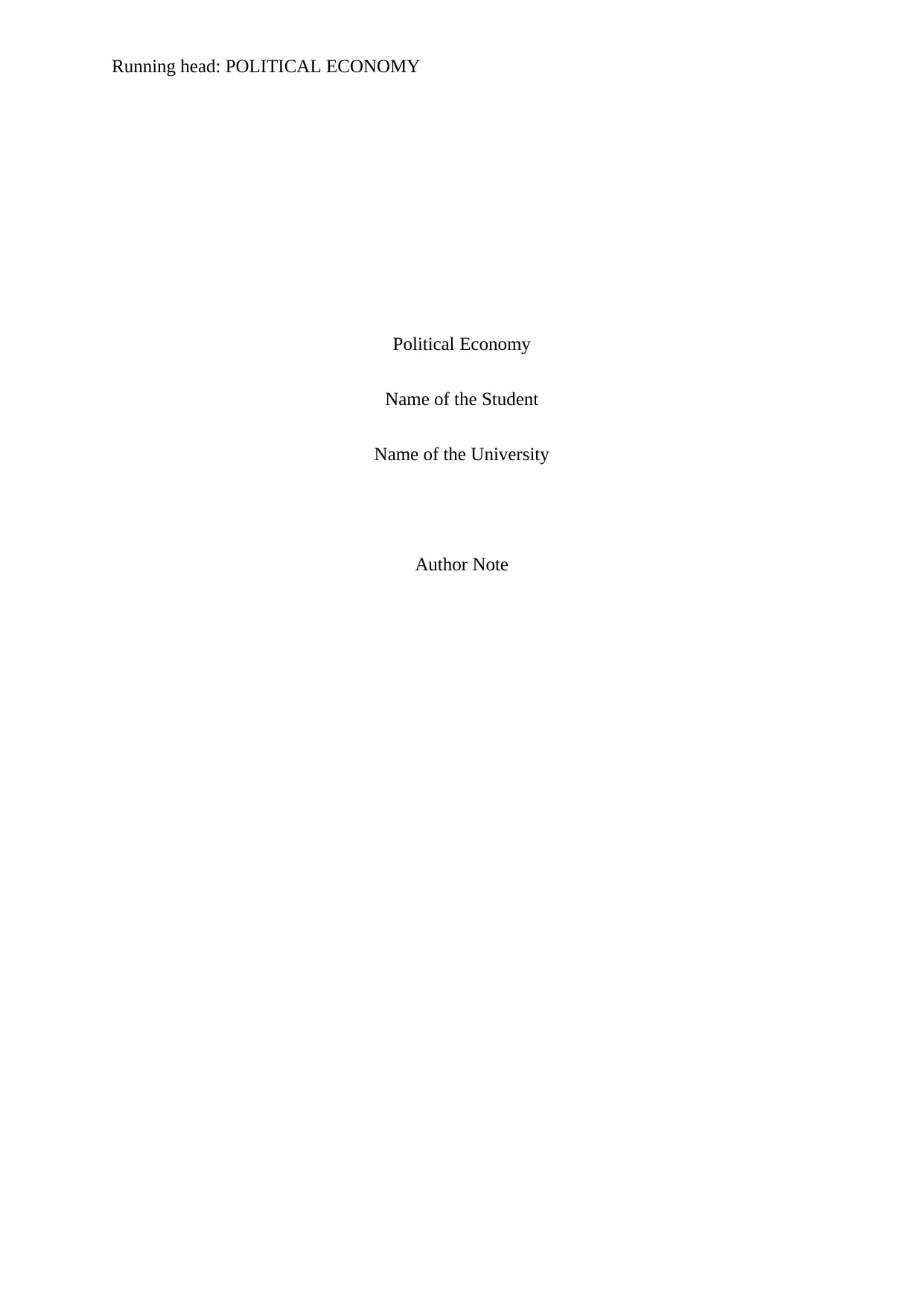
Running head: POLITICAL ECONOMY
Political Economy
Name of the Student
Name of the University
Author Note
Political Economy
Name of the Student
Name of the University
Author Note
Paraphrase This Document
Need a fresh take? Get an instant paraphrase of this document with our AI Paraphraser
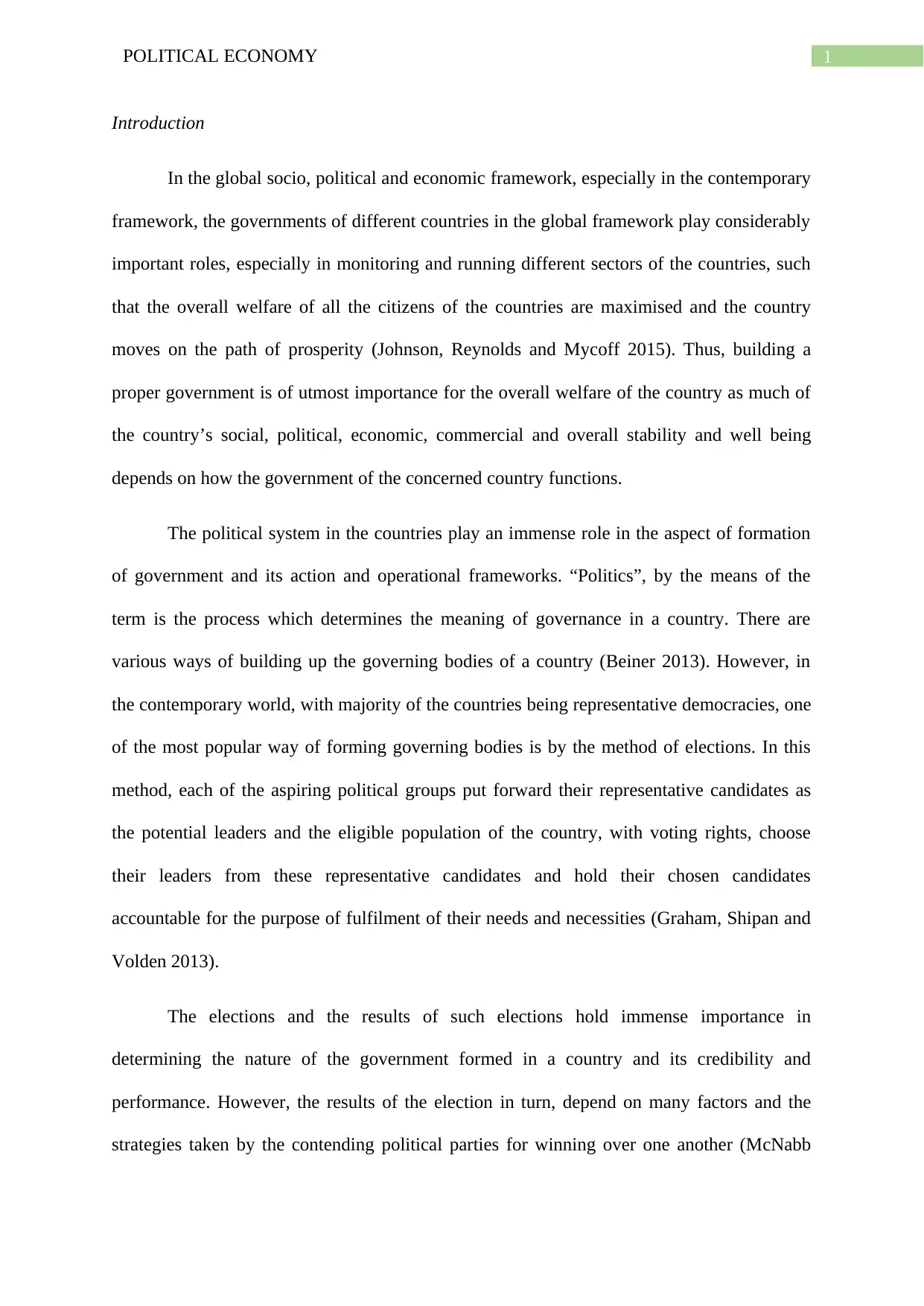
1POLITICAL ECONOMY
Introduction
In the global socio, political and economic framework, especially in the contemporary
framework, the governments of different countries in the global framework play considerably
important roles, especially in monitoring and running different sectors of the countries, such
that the overall welfare of all the citizens of the countries are maximised and the country
moves on the path of prosperity (Johnson, Reynolds and Mycoff 2015). Thus, building a
proper government is of utmost importance for the overall welfare of the country as much of
the country’s social, political, economic, commercial and overall stability and well being
depends on how the government of the concerned country functions.
The political system in the countries play an immense role in the aspect of formation
of government and its action and operational frameworks. “Politics”, by the means of the
term is the process which determines the meaning of governance in a country. There are
various ways of building up the governing bodies of a country (Beiner 2013). However, in
the contemporary world, with majority of the countries being representative democracies, one
of the most popular way of forming governing bodies is by the method of elections. In this
method, each of the aspiring political groups put forward their representative candidates as
the potential leaders and the eligible population of the country, with voting rights, choose
their leaders from these representative candidates and hold their chosen candidates
accountable for the purpose of fulfilment of their needs and necessities (Graham, Shipan and
Volden 2013).
The elections and the results of such elections hold immense importance in
determining the nature of the government formed in a country and its credibility and
performance. However, the results of the election in turn, depend on many factors and the
strategies taken by the contending political parties for winning over one another (McNabb
Introduction
In the global socio, political and economic framework, especially in the contemporary
framework, the governments of different countries in the global framework play considerably
important roles, especially in monitoring and running different sectors of the countries, such
that the overall welfare of all the citizens of the countries are maximised and the country
moves on the path of prosperity (Johnson, Reynolds and Mycoff 2015). Thus, building a
proper government is of utmost importance for the overall welfare of the country as much of
the country’s social, political, economic, commercial and overall stability and well being
depends on how the government of the concerned country functions.
The political system in the countries play an immense role in the aspect of formation
of government and its action and operational frameworks. “Politics”, by the means of the
term is the process which determines the meaning of governance in a country. There are
various ways of building up the governing bodies of a country (Beiner 2013). However, in
the contemporary world, with majority of the countries being representative democracies, one
of the most popular way of forming governing bodies is by the method of elections. In this
method, each of the aspiring political groups put forward their representative candidates as
the potential leaders and the eligible population of the country, with voting rights, choose
their leaders from these representative candidates and hold their chosen candidates
accountable for the purpose of fulfilment of their needs and necessities (Graham, Shipan and
Volden 2013).
The elections and the results of such elections hold immense importance in
determining the nature of the government formed in a country and its credibility and
performance. However, the results of the election in turn, depend on many factors and the
strategies taken by the contending political parties for winning over one another (McNabb
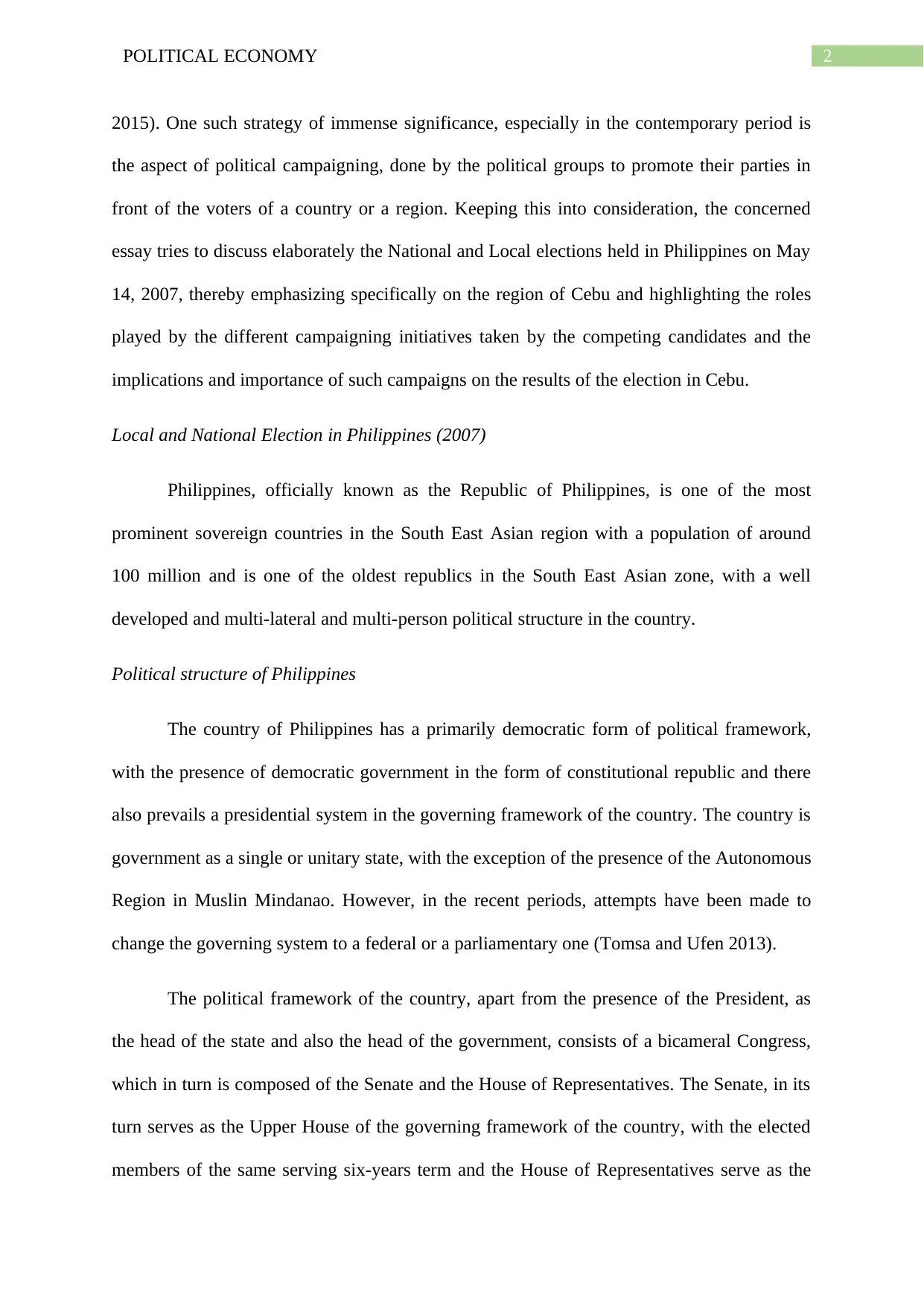
2POLITICAL ECONOMY
2015). One such strategy of immense significance, especially in the contemporary period is
the aspect of political campaigning, done by the political groups to promote their parties in
front of the voters of a country or a region. Keeping this into consideration, the concerned
essay tries to discuss elaborately the National and Local elections held in Philippines on May
14, 2007, thereby emphasizing specifically on the region of Cebu and highlighting the roles
played by the different campaigning initiatives taken by the competing candidates and the
implications and importance of such campaigns on the results of the election in Cebu.
Local and National Election in Philippines (2007)
Philippines, officially known as the Republic of Philippines, is one of the most
prominent sovereign countries in the South East Asian region with a population of around
100 million and is one of the oldest republics in the South East Asian zone, with a well
developed and multi-lateral and multi-person political structure in the country.
Political structure of Philippines
The country of Philippines has a primarily democratic form of political framework,
with the presence of democratic government in the form of constitutional republic and there
also prevails a presidential system in the governing framework of the country. The country is
government as a single or unitary state, with the exception of the presence of the Autonomous
Region in Muslin Mindanao. However, in the recent periods, attempts have been made to
change the governing system to a federal or a parliamentary one (Tomsa and Ufen 2013).
The political framework of the country, apart from the presence of the President, as
the head of the state and also the head of the government, consists of a bicameral Congress,
which in turn is composed of the Senate and the House of Representatives. The Senate, in its
turn serves as the Upper House of the governing framework of the country, with the elected
members of the same serving six-years term and the House of Representatives serve as the
2015). One such strategy of immense significance, especially in the contemporary period is
the aspect of political campaigning, done by the political groups to promote their parties in
front of the voters of a country or a region. Keeping this into consideration, the concerned
essay tries to discuss elaborately the National and Local elections held in Philippines on May
14, 2007, thereby emphasizing specifically on the region of Cebu and highlighting the roles
played by the different campaigning initiatives taken by the competing candidates and the
implications and importance of such campaigns on the results of the election in Cebu.
Local and National Election in Philippines (2007)
Philippines, officially known as the Republic of Philippines, is one of the most
prominent sovereign countries in the South East Asian region with a population of around
100 million and is one of the oldest republics in the South East Asian zone, with a well
developed and multi-lateral and multi-person political structure in the country.
Political structure of Philippines
The country of Philippines has a primarily democratic form of political framework,
with the presence of democratic government in the form of constitutional republic and there
also prevails a presidential system in the governing framework of the country. The country is
government as a single or unitary state, with the exception of the presence of the Autonomous
Region in Muslin Mindanao. However, in the recent periods, attempts have been made to
change the governing system to a federal or a parliamentary one (Tomsa and Ufen 2013).
The political framework of the country, apart from the presence of the President, as
the head of the state and also the head of the government, consists of a bicameral Congress,
which in turn is composed of the Senate and the House of Representatives. The Senate, in its
turn serves as the Upper House of the governing framework of the country, with the elected
members of the same serving six-years term and the House of Representatives serve as the
⊘ This is a preview!⊘
Do you want full access?
Subscribe today to unlock all pages.

Trusted by 1+ million students worldwide
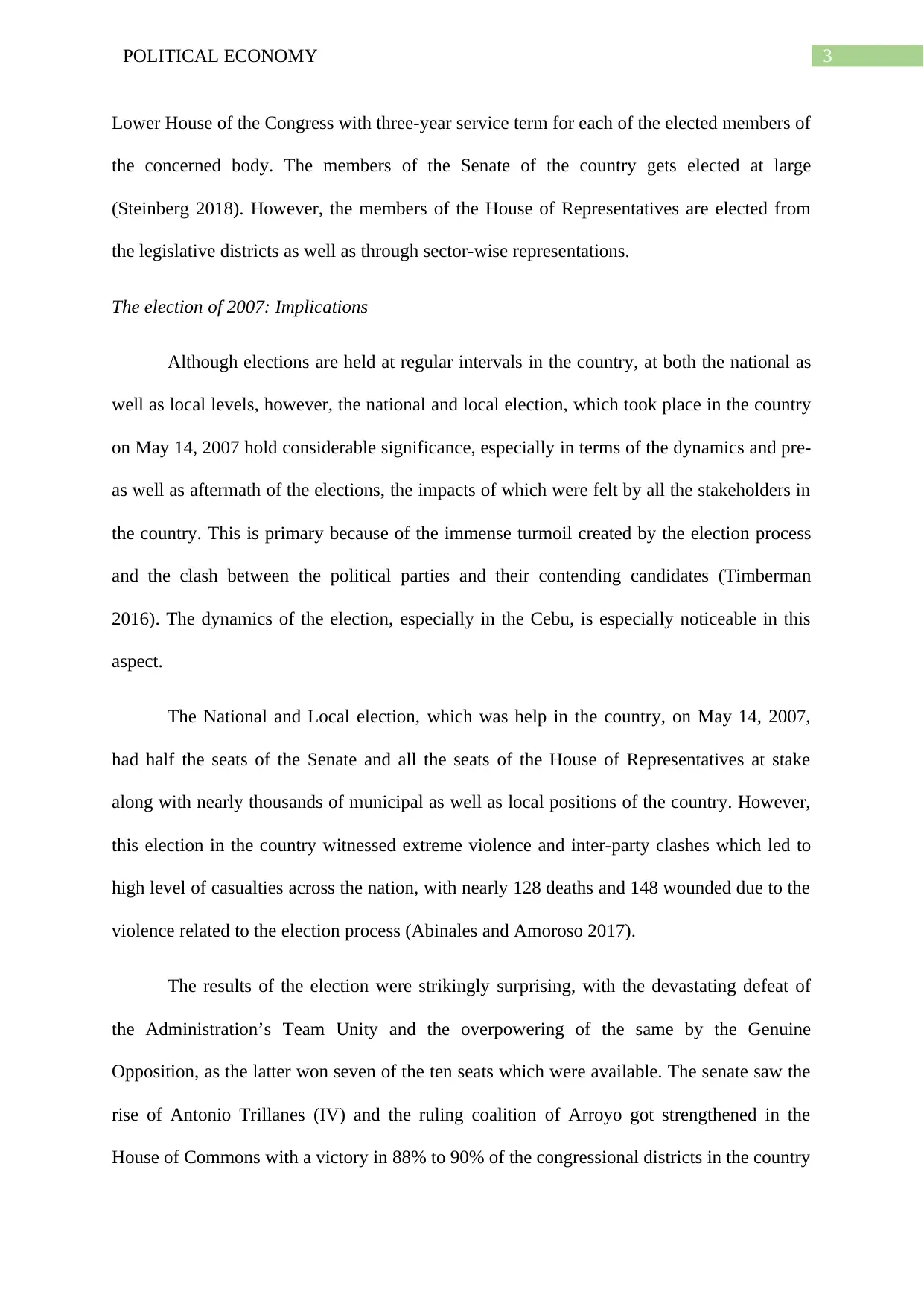
3POLITICAL ECONOMY
Lower House of the Congress with three-year service term for each of the elected members of
the concerned body. The members of the Senate of the country gets elected at large
(Steinberg 2018). However, the members of the House of Representatives are elected from
the legislative districts as well as through sector-wise representations.
The election of 2007: Implications
Although elections are held at regular intervals in the country, at both the national as
well as local levels, however, the national and local election, which took place in the country
on May 14, 2007 hold considerable significance, especially in terms of the dynamics and pre-
as well as aftermath of the elections, the impacts of which were felt by all the stakeholders in
the country. This is primary because of the immense turmoil created by the election process
and the clash between the political parties and their contending candidates (Timberman
2016). The dynamics of the election, especially in the Cebu, is especially noticeable in this
aspect.
The National and Local election, which was help in the country, on May 14, 2007,
had half the seats of the Senate and all the seats of the House of Representatives at stake
along with nearly thousands of municipal as well as local positions of the country. However,
this election in the country witnessed extreme violence and inter-party clashes which led to
high level of casualties across the nation, with nearly 128 deaths and 148 wounded due to the
violence related to the election process (Abinales and Amoroso 2017).
The results of the election were strikingly surprising, with the devastating defeat of
the Administration’s Team Unity and the overpowering of the same by the Genuine
Opposition, as the latter won seven of the ten seats which were available. The senate saw the
rise of Antonio Trillanes (IV) and the ruling coalition of Arroyo got strengthened in the
House of Commons with a victory in 88% to 90% of the congressional districts in the country
Lower House of the Congress with three-year service term for each of the elected members of
the concerned body. The members of the Senate of the country gets elected at large
(Steinberg 2018). However, the members of the House of Representatives are elected from
the legislative districts as well as through sector-wise representations.
The election of 2007: Implications
Although elections are held at regular intervals in the country, at both the national as
well as local levels, however, the national and local election, which took place in the country
on May 14, 2007 hold considerable significance, especially in terms of the dynamics and pre-
as well as aftermath of the elections, the impacts of which were felt by all the stakeholders in
the country. This is primary because of the immense turmoil created by the election process
and the clash between the political parties and their contending candidates (Timberman
2016). The dynamics of the election, especially in the Cebu, is especially noticeable in this
aspect.
The National and Local election, which was help in the country, on May 14, 2007,
had half the seats of the Senate and all the seats of the House of Representatives at stake
along with nearly thousands of municipal as well as local positions of the country. However,
this election in the country witnessed extreme violence and inter-party clashes which led to
high level of casualties across the nation, with nearly 128 deaths and 148 wounded due to the
violence related to the election process (Abinales and Amoroso 2017).
The results of the election were strikingly surprising, with the devastating defeat of
the Administration’s Team Unity and the overpowering of the same by the Genuine
Opposition, as the latter won seven of the ten seats which were available. The senate saw the
rise of Antonio Trillanes (IV) and the ruling coalition of Arroyo got strengthened in the
House of Commons with a victory in 88% to 90% of the congressional districts in the country
Paraphrase This Document
Need a fresh take? Get an instant paraphrase of this document with our AI Paraphraser
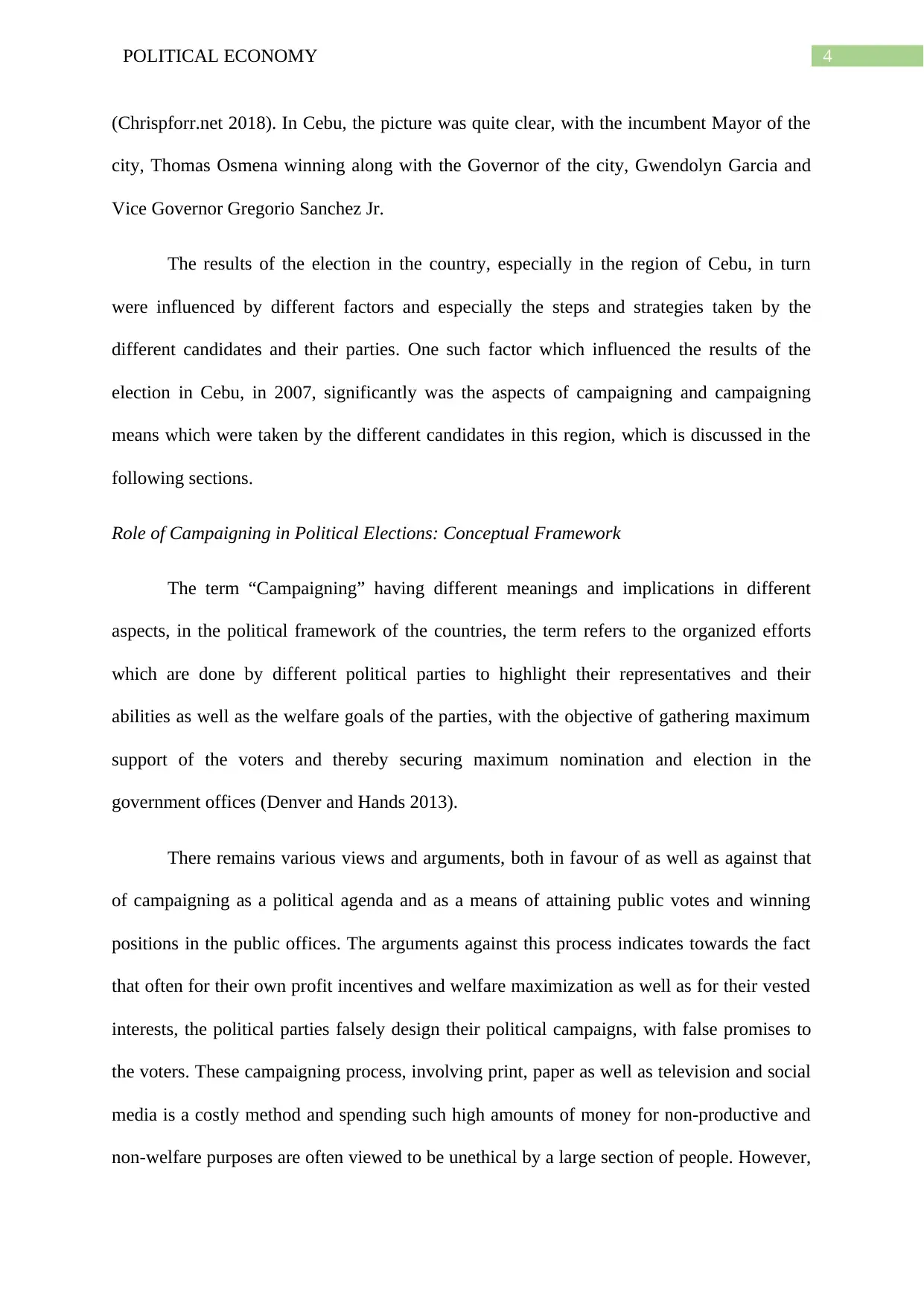
4POLITICAL ECONOMY
(Chrispforr.net 2018). In Cebu, the picture was quite clear, with the incumbent Mayor of the
city, Thomas Osmena winning along with the Governor of the city, Gwendolyn Garcia and
Vice Governor Gregorio Sanchez Jr.
The results of the election in the country, especially in the region of Cebu, in turn
were influenced by different factors and especially the steps and strategies taken by the
different candidates and their parties. One such factor which influenced the results of the
election in Cebu, in 2007, significantly was the aspects of campaigning and campaigning
means which were taken by the different candidates in this region, which is discussed in the
following sections.
Role of Campaigning in Political Elections: Conceptual Framework
The term “Campaigning” having different meanings and implications in different
aspects, in the political framework of the countries, the term refers to the organized efforts
which are done by different political parties to highlight their representatives and their
abilities as well as the welfare goals of the parties, with the objective of gathering maximum
support of the voters and thereby securing maximum nomination and election in the
government offices (Denver and Hands 2013).
There remains various views and arguments, both in favour of as well as against that
of campaigning as a political agenda and as a means of attaining public votes and winning
positions in the public offices. The arguments against this process indicates towards the fact
that often for their own profit incentives and welfare maximization as well as for their vested
interests, the political parties falsely design their political campaigns, with false promises to
the voters. These campaigning process, involving print, paper as well as television and social
media is a costly method and spending such high amounts of money for non-productive and
non-welfare purposes are often viewed to be unethical by a large section of people. However,
(Chrispforr.net 2018). In Cebu, the picture was quite clear, with the incumbent Mayor of the
city, Thomas Osmena winning along with the Governor of the city, Gwendolyn Garcia and
Vice Governor Gregorio Sanchez Jr.
The results of the election in the country, especially in the region of Cebu, in turn
were influenced by different factors and especially the steps and strategies taken by the
different candidates and their parties. One such factor which influenced the results of the
election in Cebu, in 2007, significantly was the aspects of campaigning and campaigning
means which were taken by the different candidates in this region, which is discussed in the
following sections.
Role of Campaigning in Political Elections: Conceptual Framework
The term “Campaigning” having different meanings and implications in different
aspects, in the political framework of the countries, the term refers to the organized efforts
which are done by different political parties to highlight their representatives and their
abilities as well as the welfare goals of the parties, with the objective of gathering maximum
support of the voters and thereby securing maximum nomination and election in the
government offices (Denver and Hands 2013).
There remains various views and arguments, both in favour of as well as against that
of campaigning as a political agenda and as a means of attaining public votes and winning
positions in the public offices. The arguments against this process indicates towards the fact
that often for their own profit incentives and welfare maximization as well as for their vested
interests, the political parties falsely design their political campaigns, with false promises to
the voters. These campaigning process, involving print, paper as well as television and social
media is a costly method and spending such high amounts of money for non-productive and
non-welfare purposes are often viewed to be unethical by a large section of people. However,
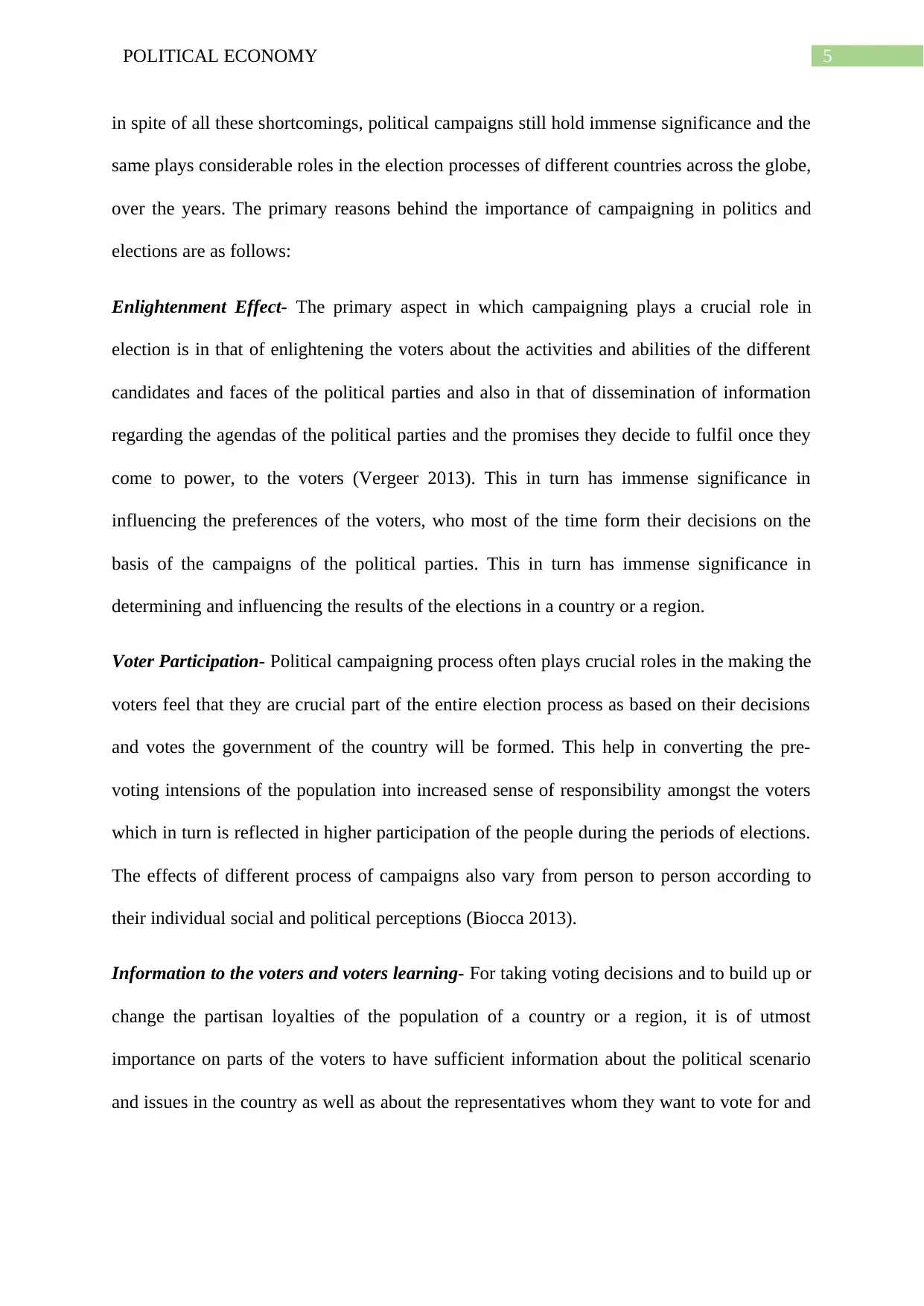
5POLITICAL ECONOMY
in spite of all these shortcomings, political campaigns still hold immense significance and the
same plays considerable roles in the election processes of different countries across the globe,
over the years. The primary reasons behind the importance of campaigning in politics and
elections are as follows:
Enlightenment Effect- The primary aspect in which campaigning plays a crucial role in
election is in that of enlightening the voters about the activities and abilities of the different
candidates and faces of the political parties and also in that of dissemination of information
regarding the agendas of the political parties and the promises they decide to fulfil once they
come to power, to the voters (Vergeer 2013). This in turn has immense significance in
influencing the preferences of the voters, who most of the time form their decisions on the
basis of the campaigns of the political parties. This in turn has immense significance in
determining and influencing the results of the elections in a country or a region.
Voter Participation- Political campaigning process often plays crucial roles in the making the
voters feel that they are crucial part of the entire election process as based on their decisions
and votes the government of the country will be formed. This help in converting the pre-
voting intensions of the population into increased sense of responsibility amongst the voters
which in turn is reflected in higher participation of the people during the periods of elections.
The effects of different process of campaigns also vary from person to person according to
their individual social and political perceptions (Biocca 2013).
Information to the voters and voters learning- For taking voting decisions and to build up or
change the partisan loyalties of the population of a country or a region, it is of utmost
importance on parts of the voters to have sufficient information about the political scenario
and issues in the country as well as about the representatives whom they want to vote for and
in spite of all these shortcomings, political campaigns still hold immense significance and the
same plays considerable roles in the election processes of different countries across the globe,
over the years. The primary reasons behind the importance of campaigning in politics and
elections are as follows:
Enlightenment Effect- The primary aspect in which campaigning plays a crucial role in
election is in that of enlightening the voters about the activities and abilities of the different
candidates and faces of the political parties and also in that of dissemination of information
regarding the agendas of the political parties and the promises they decide to fulfil once they
come to power, to the voters (Vergeer 2013). This in turn has immense significance in
influencing the preferences of the voters, who most of the time form their decisions on the
basis of the campaigns of the political parties. This in turn has immense significance in
determining and influencing the results of the elections in a country or a region.
Voter Participation- Political campaigning process often plays crucial roles in the making the
voters feel that they are crucial part of the entire election process as based on their decisions
and votes the government of the country will be formed. This help in converting the pre-
voting intensions of the population into increased sense of responsibility amongst the voters
which in turn is reflected in higher participation of the people during the periods of elections.
The effects of different process of campaigns also vary from person to person according to
their individual social and political perceptions (Biocca 2013).
Information to the voters and voters learning- For taking voting decisions and to build up or
change the partisan loyalties of the population of a country or a region, it is of utmost
importance on parts of the voters to have sufficient information about the political scenario
and issues in the country as well as about the representatives whom they want to vote for and
⊘ This is a preview!⊘
Do you want full access?
Subscribe today to unlock all pages.

Trusted by 1+ million students worldwide
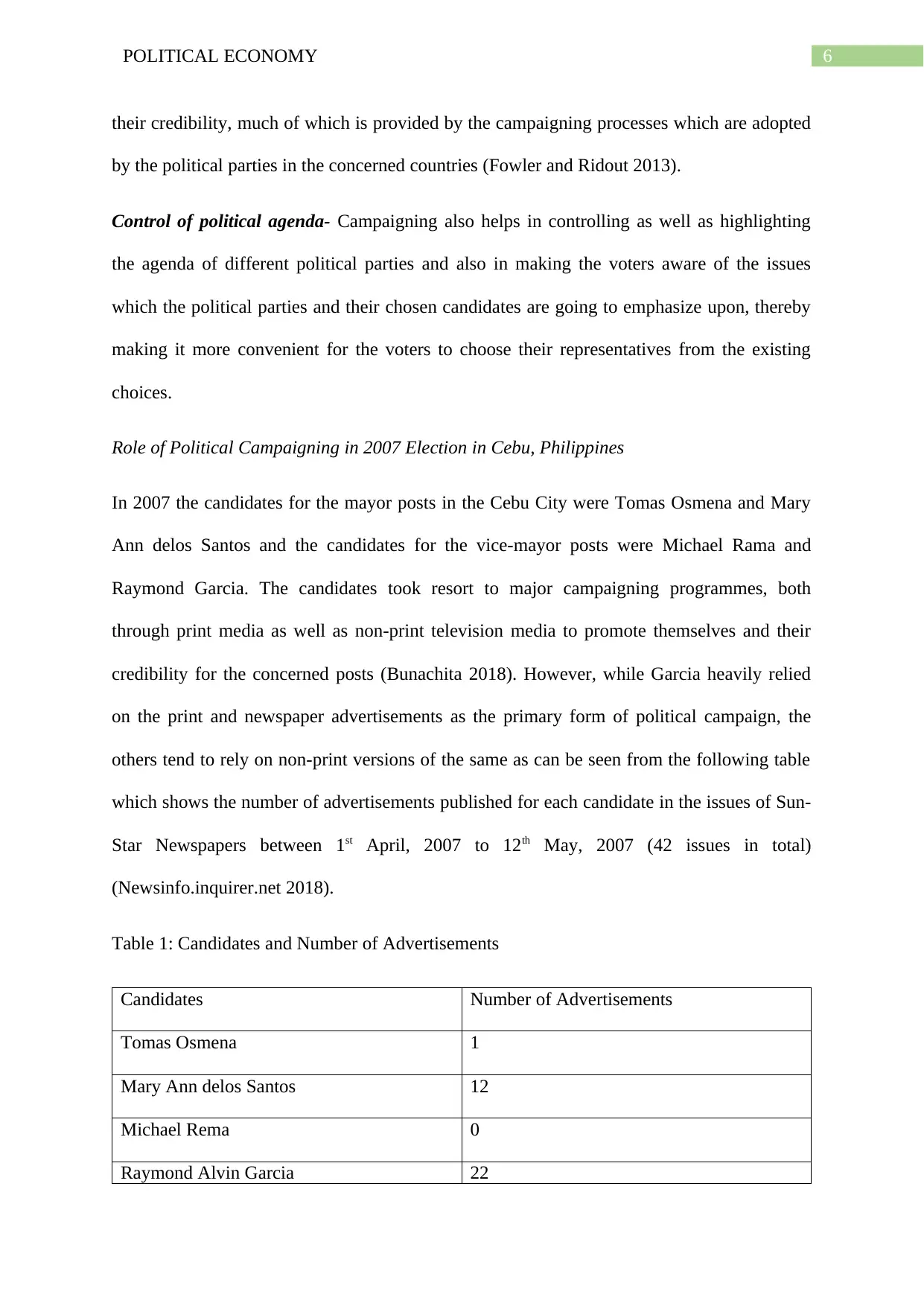
6POLITICAL ECONOMY
their credibility, much of which is provided by the campaigning processes which are adopted
by the political parties in the concerned countries (Fowler and Ridout 2013).
Control of political agenda- Campaigning also helps in controlling as well as highlighting
the agenda of different political parties and also in making the voters aware of the issues
which the political parties and their chosen candidates are going to emphasize upon, thereby
making it more convenient for the voters to choose their representatives from the existing
choices.
Role of Political Campaigning in 2007 Election in Cebu, Philippines
In 2007 the candidates for the mayor posts in the Cebu City were Tomas Osmena and Mary
Ann delos Santos and the candidates for the vice-mayor posts were Michael Rama and
Raymond Garcia. The candidates took resort to major campaigning programmes, both
through print media as well as non-print television media to promote themselves and their
credibility for the concerned posts (Bunachita 2018). However, while Garcia heavily relied
on the print and newspaper advertisements as the primary form of political campaign, the
others tend to rely on non-print versions of the same as can be seen from the following table
which shows the number of advertisements published for each candidate in the issues of Sun-
Star Newspapers between 1st April, 2007 to 12th May, 2007 (42 issues in total)
(Newsinfo.inquirer.net 2018).
Table 1: Candidates and Number of Advertisements
Candidates Number of Advertisements
Tomas Osmena 1
Mary Ann delos Santos 12
Michael Rema 0
Raymond Alvin Garcia 22
their credibility, much of which is provided by the campaigning processes which are adopted
by the political parties in the concerned countries (Fowler and Ridout 2013).
Control of political agenda- Campaigning also helps in controlling as well as highlighting
the agenda of different political parties and also in making the voters aware of the issues
which the political parties and their chosen candidates are going to emphasize upon, thereby
making it more convenient for the voters to choose their representatives from the existing
choices.
Role of Political Campaigning in 2007 Election in Cebu, Philippines
In 2007 the candidates for the mayor posts in the Cebu City were Tomas Osmena and Mary
Ann delos Santos and the candidates for the vice-mayor posts were Michael Rama and
Raymond Garcia. The candidates took resort to major campaigning programmes, both
through print media as well as non-print television media to promote themselves and their
credibility for the concerned posts (Bunachita 2018). However, while Garcia heavily relied
on the print and newspaper advertisements as the primary form of political campaign, the
others tend to rely on non-print versions of the same as can be seen from the following table
which shows the number of advertisements published for each candidate in the issues of Sun-
Star Newspapers between 1st April, 2007 to 12th May, 2007 (42 issues in total)
(Newsinfo.inquirer.net 2018).
Table 1: Candidates and Number of Advertisements
Candidates Number of Advertisements
Tomas Osmena 1
Mary Ann delos Santos 12
Michael Rema 0
Raymond Alvin Garcia 22
Paraphrase This Document
Need a fresh take? Get an instant paraphrase of this document with our AI Paraphraser
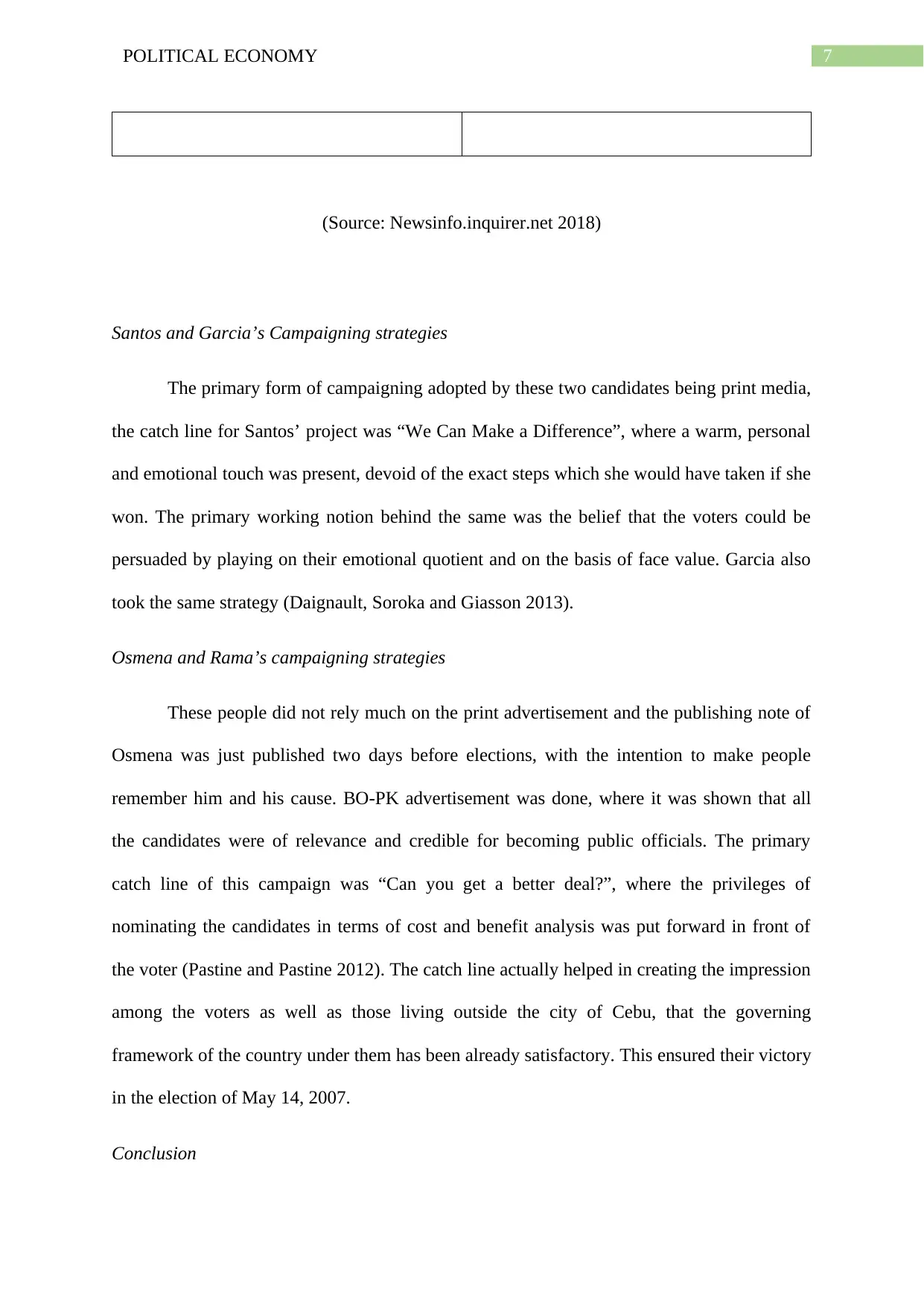
7POLITICAL ECONOMY
(Source: Newsinfo.inquirer.net 2018)
Santos and Garcia’s Campaigning strategies
The primary form of campaigning adopted by these two candidates being print media,
the catch line for Santos’ project was “We Can Make a Difference”, where a warm, personal
and emotional touch was present, devoid of the exact steps which she would have taken if she
won. The primary working notion behind the same was the belief that the voters could be
persuaded by playing on their emotional quotient and on the basis of face value. Garcia also
took the same strategy (Daignault, Soroka and Giasson 2013).
Osmena and Rama’s campaigning strategies
These people did not rely much on the print advertisement and the publishing note of
Osmena was just published two days before elections, with the intention to make people
remember him and his cause. BO-PK advertisement was done, where it was shown that all
the candidates were of relevance and credible for becoming public officials. The primary
catch line of this campaign was “Can you get a better deal?”, where the privileges of
nominating the candidates in terms of cost and benefit analysis was put forward in front of
the voter (Pastine and Pastine 2012). The catch line actually helped in creating the impression
among the voters as well as those living outside the city of Cebu, that the governing
framework of the country under them has been already satisfactory. This ensured their victory
in the election of May 14, 2007.
Conclusion
(Source: Newsinfo.inquirer.net 2018)
Santos and Garcia’s Campaigning strategies
The primary form of campaigning adopted by these two candidates being print media,
the catch line for Santos’ project was “We Can Make a Difference”, where a warm, personal
and emotional touch was present, devoid of the exact steps which she would have taken if she
won. The primary working notion behind the same was the belief that the voters could be
persuaded by playing on their emotional quotient and on the basis of face value. Garcia also
took the same strategy (Daignault, Soroka and Giasson 2013).
Osmena and Rama’s campaigning strategies
These people did not rely much on the print advertisement and the publishing note of
Osmena was just published two days before elections, with the intention to make people
remember him and his cause. BO-PK advertisement was done, where it was shown that all
the candidates were of relevance and credible for becoming public officials. The primary
catch line of this campaign was “Can you get a better deal?”, where the privileges of
nominating the candidates in terms of cost and benefit analysis was put forward in front of
the voter (Pastine and Pastine 2012). The catch line actually helped in creating the impression
among the voters as well as those living outside the city of Cebu, that the governing
framework of the country under them has been already satisfactory. This ensured their victory
in the election of May 14, 2007.
Conclusion
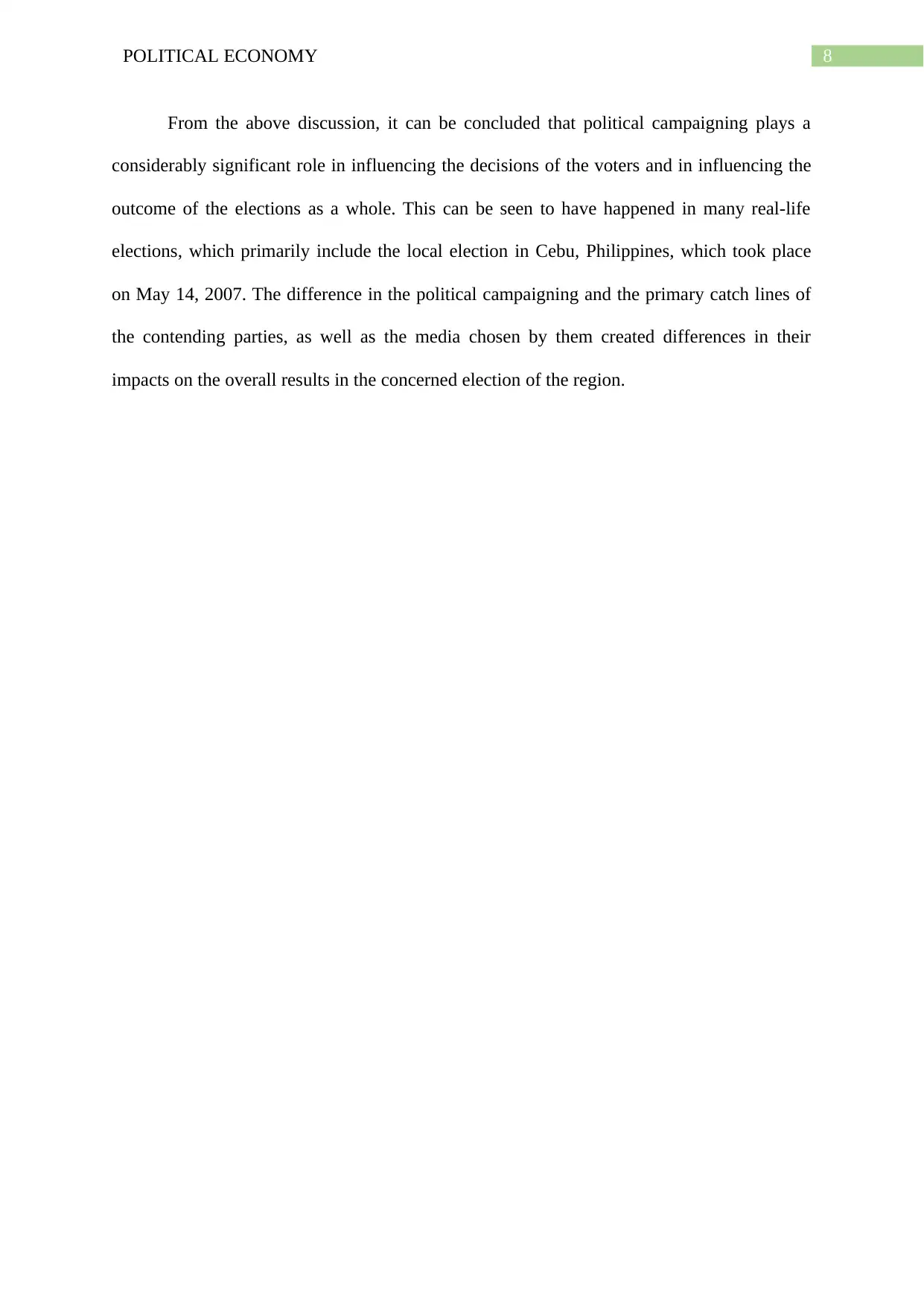
8POLITICAL ECONOMY
From the above discussion, it can be concluded that political campaigning plays a
considerably significant role in influencing the decisions of the voters and in influencing the
outcome of the elections as a whole. This can be seen to have happened in many real-life
elections, which primarily include the local election in Cebu, Philippines, which took place
on May 14, 2007. The difference in the political campaigning and the primary catch lines of
the contending parties, as well as the media chosen by them created differences in their
impacts on the overall results in the concerned election of the region.
From the above discussion, it can be concluded that political campaigning plays a
considerably significant role in influencing the decisions of the voters and in influencing the
outcome of the elections as a whole. This can be seen to have happened in many real-life
elections, which primarily include the local election in Cebu, Philippines, which took place
on May 14, 2007. The difference in the political campaigning and the primary catch lines of
the contending parties, as well as the media chosen by them created differences in their
impacts on the overall results in the concerned election of the region.
⊘ This is a preview!⊘
Do you want full access?
Subscribe today to unlock all pages.

Trusted by 1+ million students worldwide
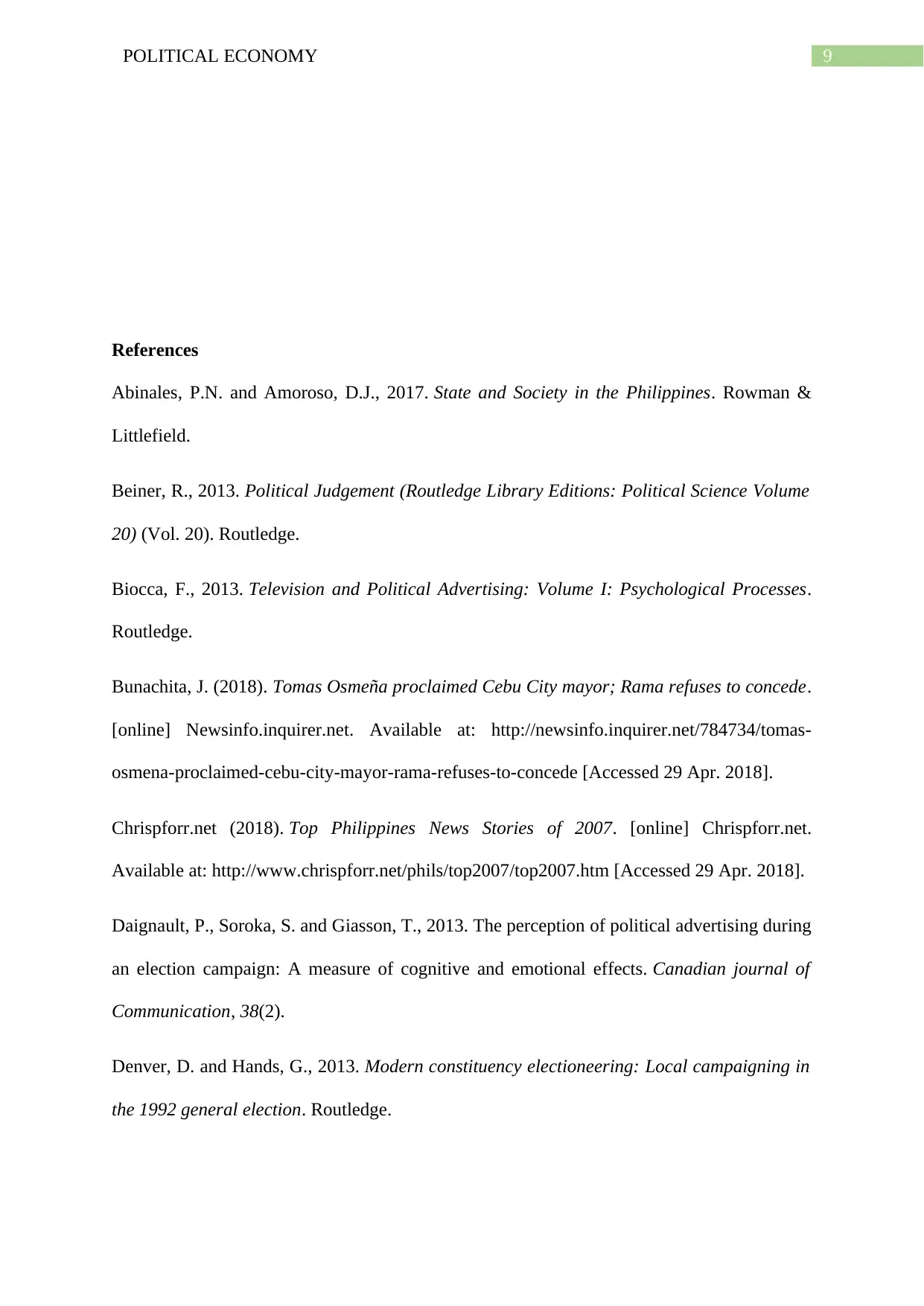
9POLITICAL ECONOMY
References
Abinales, P.N. and Amoroso, D.J., 2017. State and Society in the Philippines. Rowman &
Littlefield.
Beiner, R., 2013. Political Judgement (Routledge Library Editions: Political Science Volume
20) (Vol. 20). Routledge.
Biocca, F., 2013. Television and Political Advertising: Volume I: Psychological Processes.
Routledge.
Bunachita, J. (2018). Tomas Osmeña proclaimed Cebu City mayor; Rama refuses to concede.
[online] Newsinfo.inquirer.net. Available at: http://newsinfo.inquirer.net/784734/tomas-
osmena-proclaimed-cebu-city-mayor-rama-refuses-to-concede [Accessed 29 Apr. 2018].
Chrispforr.net (2018). Top Philippines News Stories of 2007. [online] Chrispforr.net.
Available at: http://www.chrispforr.net/phils/top2007/top2007.htm [Accessed 29 Apr. 2018].
Daignault, P., Soroka, S. and Giasson, T., 2013. The perception of political advertising during
an election campaign: A measure of cognitive and emotional effects. Canadian journal of
Communication, 38(2).
Denver, D. and Hands, G., 2013. Modern constituency electioneering: Local campaigning in
the 1992 general election. Routledge.
References
Abinales, P.N. and Amoroso, D.J., 2017. State and Society in the Philippines. Rowman &
Littlefield.
Beiner, R., 2013. Political Judgement (Routledge Library Editions: Political Science Volume
20) (Vol. 20). Routledge.
Biocca, F., 2013. Television and Political Advertising: Volume I: Psychological Processes.
Routledge.
Bunachita, J. (2018). Tomas Osmeña proclaimed Cebu City mayor; Rama refuses to concede.
[online] Newsinfo.inquirer.net. Available at: http://newsinfo.inquirer.net/784734/tomas-
osmena-proclaimed-cebu-city-mayor-rama-refuses-to-concede [Accessed 29 Apr. 2018].
Chrispforr.net (2018). Top Philippines News Stories of 2007. [online] Chrispforr.net.
Available at: http://www.chrispforr.net/phils/top2007/top2007.htm [Accessed 29 Apr. 2018].
Daignault, P., Soroka, S. and Giasson, T., 2013. The perception of political advertising during
an election campaign: A measure of cognitive and emotional effects. Canadian journal of
Communication, 38(2).
Denver, D. and Hands, G., 2013. Modern constituency electioneering: Local campaigning in
the 1992 general election. Routledge.
Paraphrase This Document
Need a fresh take? Get an instant paraphrase of this document with our AI Paraphraser
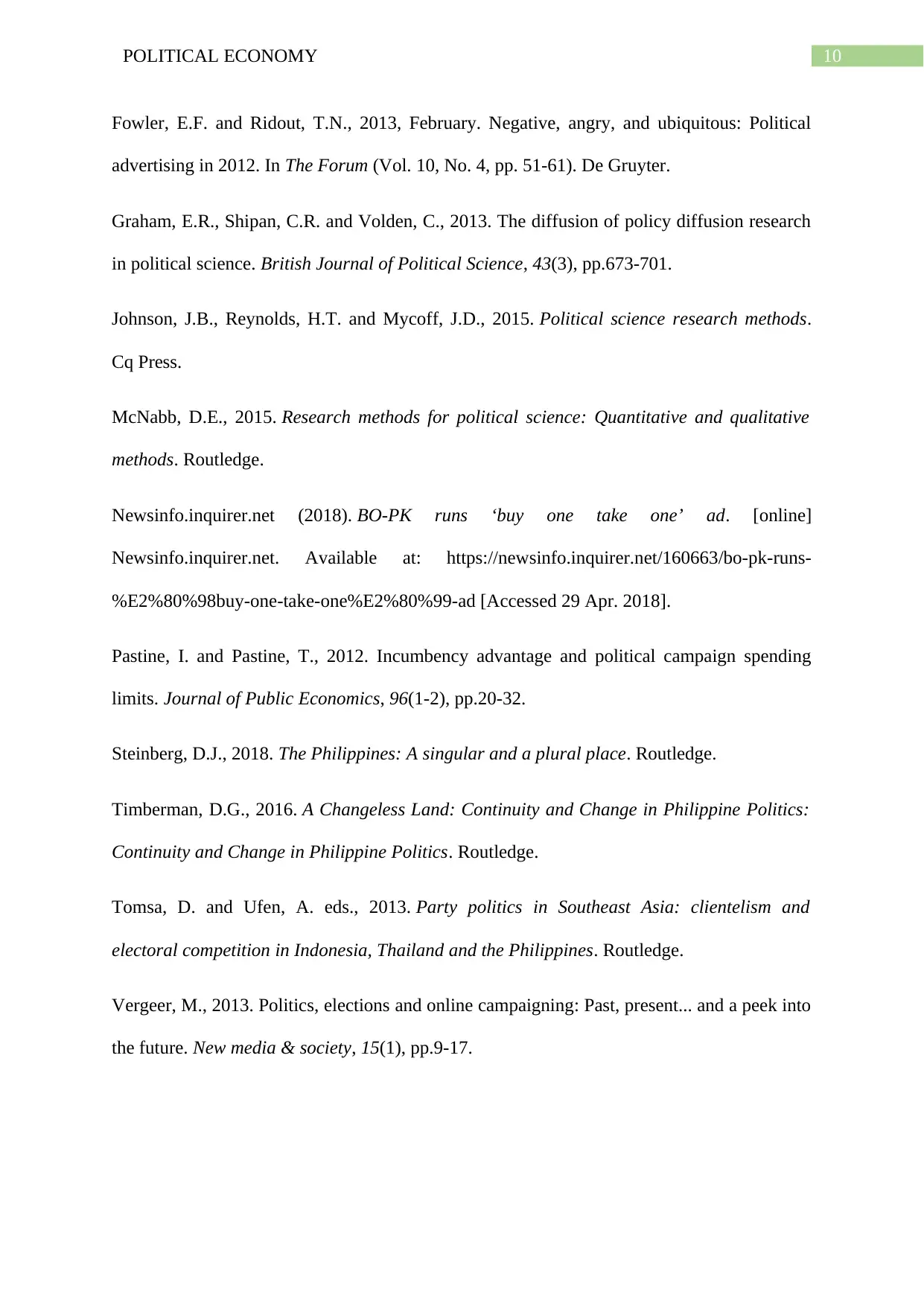
10POLITICAL ECONOMY
Fowler, E.F. and Ridout, T.N., 2013, February. Negative, angry, and ubiquitous: Political
advertising in 2012. In The Forum (Vol. 10, No. 4, pp. 51-61). De Gruyter.
Graham, E.R., Shipan, C.R. and Volden, C., 2013. The diffusion of policy diffusion research
in political science. British Journal of Political Science, 43(3), pp.673-701.
Johnson, J.B., Reynolds, H.T. and Mycoff, J.D., 2015. Political science research methods.
Cq Press.
McNabb, D.E., 2015. Research methods for political science: Quantitative and qualitative
methods. Routledge.
Newsinfo.inquirer.net (2018). BO-PK runs ‘buy one take one’ ad. [online]
Newsinfo.inquirer.net. Available at: https://newsinfo.inquirer.net/160663/bo-pk-runs-
%E2%80%98buy-one-take-one%E2%80%99-ad [Accessed 29 Apr. 2018].
Pastine, I. and Pastine, T., 2012. Incumbency advantage and political campaign spending
limits. Journal of Public Economics, 96(1-2), pp.20-32.
Steinberg, D.J., 2018. The Philippines: A singular and a plural place. Routledge.
Timberman, D.G., 2016. A Changeless Land: Continuity and Change in Philippine Politics:
Continuity and Change in Philippine Politics. Routledge.
Tomsa, D. and Ufen, A. eds., 2013. Party politics in Southeast Asia: clientelism and
electoral competition in Indonesia, Thailand and the Philippines. Routledge.
Vergeer, M., 2013. Politics, elections and online campaigning: Past, present... and a peek into
the future. New media & society, 15(1), pp.9-17.
Fowler, E.F. and Ridout, T.N., 2013, February. Negative, angry, and ubiquitous: Political
advertising in 2012. In The Forum (Vol. 10, No. 4, pp. 51-61). De Gruyter.
Graham, E.R., Shipan, C.R. and Volden, C., 2013. The diffusion of policy diffusion research
in political science. British Journal of Political Science, 43(3), pp.673-701.
Johnson, J.B., Reynolds, H.T. and Mycoff, J.D., 2015. Political science research methods.
Cq Press.
McNabb, D.E., 2015. Research methods for political science: Quantitative and qualitative
methods. Routledge.
Newsinfo.inquirer.net (2018). BO-PK runs ‘buy one take one’ ad. [online]
Newsinfo.inquirer.net. Available at: https://newsinfo.inquirer.net/160663/bo-pk-runs-
%E2%80%98buy-one-take-one%E2%80%99-ad [Accessed 29 Apr. 2018].
Pastine, I. and Pastine, T., 2012. Incumbency advantage and political campaign spending
limits. Journal of Public Economics, 96(1-2), pp.20-32.
Steinberg, D.J., 2018. The Philippines: A singular and a plural place. Routledge.
Timberman, D.G., 2016. A Changeless Land: Continuity and Change in Philippine Politics:
Continuity and Change in Philippine Politics. Routledge.
Tomsa, D. and Ufen, A. eds., 2013. Party politics in Southeast Asia: clientelism and
electoral competition in Indonesia, Thailand and the Philippines. Routledge.
Vergeer, M., 2013. Politics, elections and online campaigning: Past, present... and a peek into
the future. New media & society, 15(1), pp.9-17.
1 out of 11
Your All-in-One AI-Powered Toolkit for Academic Success.
+13062052269
info@desklib.com
Available 24*7 on WhatsApp / Email
![[object Object]](/_next/static/media/star-bottom.7253800d.svg)
Unlock your academic potential
Copyright © 2020–2026 A2Z Services. All Rights Reserved. Developed and managed by ZUCOL.


